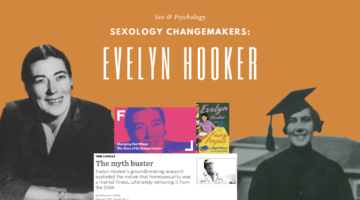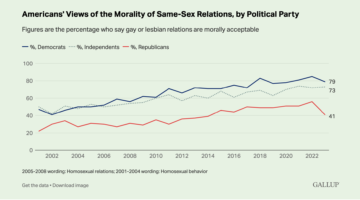Born Both Ways: Is It Evolutionarily Adaptive For Women To Have A Fluid Sexuality?
May 15, 2013 by Justin Lehmiller
Same-sex behavior has long been a conundrum for evolutionary psychologists. From an evolutionary standpoint, a trait cannot evolve unless it is linked to reproductisuccess (i.e., it has to help us pass our genes along to future generations). However, same-sex activity obviously limits one’s ability to reproduce, so why does it persist in the population? Most explanations I have seen to date have focused on providing an explanation for why male same-sex behavior is adaptive (e.g., the “gay uncle hypothesis,” which says that having a gay uncle is adaptive because they provide resources to care for their nieces and nephew). In contrast, female same-sex behavior has largely been left out of the picture…until now. A new paper published in Evolutionary Psychology lays out a hypothesis for why women seem to have evolved a fluid or “flexible” sexuality.
The idea is known as the alloparenting hypothesis, and it proposes that female sexual fluidity is a trait that evolved because it helped our female ancestors develop relationships with other women in times of need who could help care for each other’s children, thereby ensuring their survival. It is thought that our female ancestors often needed such help for a number of reasons: (1) sometimes they were raising children who were products of rape, which meant that the biological father was not providing any type of resources or investment to help raise the child, (2) sometimes the biological father would “defect” to another relationship or share his resources with other mates, and (3) sometimes the biological father would die prematurely. All of these scenarios posed challenges to mothers because not only would they have to do all of the child care on their own, but they would also have to secure food and shelter, as well as provide protection in a world without any of our modern conveniences.
Having a “flexible” or fluid sexuality could help in these situations by allowing women to obtain help and resources from a non-related woman (i.e., an “allomother,” or a woman who will act like a mother to a child who is not biologically her own). Thus, it is thought that when a father is not in the picture or is providing inadequate investment in the relationship, women’s sexuality may shift toward an interest in other women as a means of securing an alloparent.
It is important to note that the alloparenting hypothesis is just that—a hypothesis. It has yet to be tested. The authors lay out a number of interesting predictions based upon it (e.g., that mothers who have been deserted or widowed will be more likely to engage in same-sex behavior, and that single mothers who don’t have other relatives around to help raise their children will be more likely to seek out a same sex partner); however, we must await future research and testing to see if any of them hold up.
It is important to note that this hypothesis only aims to explain the phenomenon of sexual fluidity in women (i.e., the idea that some women go back and forth between different patterns of sexual identity and behavior during their lives). It does not explain why some women are lesbians, nor does it suggest that all instances of female-same-sex behavior stem from the search for an alloparent. Thus, there is a lot that this hypothesis doesn’t tell us about women’s sexuality. At the very least, however, it does provide a set of testable predictions that may ultimately help us to better understand the evolutionary significance of certain forms of female same-sex behavior.
Want to learn more about The Psychology of Human Sexuality? Click here for a complete list of articles or like the Facebook page to get articles delivered to your newsfeed.
To read more about this research, see: Kuhle, B. X., & Radtke, S. (2012). Born both ways: The alloparenting hypothesis for sexual fluidity in women. Evolutionary Psychology, 11, 304-323.
Image Source: 123rf.com
You Might Also Like:

Dr. Justin Lehmiller
Founder & Owner of Sex and PsychologyDr. Justin Lehmiller is a social psychologist and Research Fellow at The Kinsey Institute. He runs the Sex and Psychology blog and podcast and is author of the popular book Tell Me What You Want. Dr. Lehmiller is an award-winning educator, and a prolific researcher who has published more than 50 academic works.
Read full bio >


